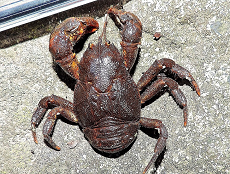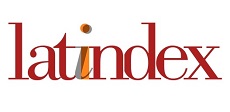
Published
Habitat and abundance of Aegla papudo (Decapoda: Anomura: Aeglidae) at two new record sites
Hábitat y abundancia de Aegla papudo (Decapoda: Anomura: Aeglidae) en dos nuevos sitios de registro
DOI:
https://doi.org/10.15446/caldasia.v44n3.94138Keywords:
Chilean pancoras, Freshwater invertebrates, Habitat selection, Threatened species, endemic decapodans (en)especies amenazadas, Invertebrados de agua dulce, Pancoras de Chile, Selección de hábitat, Decápodos endémicos (es)
Downloads
Aegla papudo is a freshwater crab endemic to Chile. Although known to inhabit turbid watercourses with gravel, sand, filamentous algae, leaf litter, and no tree cover; however, is scarce the information on the proportions of these components, physical-chemical aspects of the water, population abundance, and reproductive season. Its presence in the Cordillera El Melon led us to describe the habitat. Between 2018 and 2019, the species was searched for in seven streams. Its habitat was described, the density calculated, the water’s physical-chemical parameters recorded. The variable that explained the abundance was analyzed with a model of Poisson. The species was recorded in the Los Coiles and El Gallo streams (62 and 24 individuals respectively) with a mean density of 1 individual/m2. The abundance was explained by the volume of the mud with gravel and pebble. This investigation is the first to determine
the abundance of adults and juveniles, as well as the variable that explained it. Environments with transparent water and tree cover are new aspects of the habitat. Fecal coliforms varied remarkably. Juvenile individuals present in August suggest that reproduction takes place between summer and fall. The International Union for Conservation of Nature does not register the species; however, we agree with other researchers who propose that the species be classified as Endangered due to known threats.
Aegla papudo es un cangrejo de agua dulce endémico de Chile. Aunque se sabe que habita en cursos de agua turbios con grava, arena, algas filamentosas, hojarasca y sin cobertura arbórea, la información sobre las proporciones de estos componentes, los aspectos físico-químicos del agua, la abundancia de la población y la época de reproducción, es escasa. Su presencia en la Cordillera El Melón motivó a describir el hábitat. Entre 2018 y 2019 se buscó la especie en siete quebradas. Se describió su hábitat, se calculó la densidad y se registraron los parámetros físico-químicos del agua. Se analizó la variable que explicaba la abundancia con un modelo de Poisson. La especie se registró en las quebradas Los Coiles y El Gallo (62 y 24 individuos respectivamente) con una densidad media de 1 individuo/m2. La abundancia fue explicada por el volumen del lodo con grava y guijarros. Esta investigación es la primera en determinar la abundancia de adultos y juveniles, así como la variable que las explica. Los ambientes con agua transparente y la cobertura arbórea son aspectos nuevos del hábitat. Los coliformes fecales variaron notablemente. Los individuos juveniles en agosto sugieren que la reproducción tiene lugar entre el verano y el otoño. La Unión Internacional para la Conservación de la Naturaleza no registra la especie, pero estamos de acuerdo con otros investigadores quienes proponen que la especie se clasifique como En Peligro debido a las amenazas conocidas.
References
Bahamonde N, López MT. 1961. Estudios biológicos en la populacion de Aegla laevis laevis (Latreille) de el Monte (Crustacea, Decapoda, Anomura). Investigaciones Zoológicas Chilenas 7:19-58.
Bahamonde N, Carvacho A, Jara C, López M, Ponce F, Retamal MA, Rudolph E. 1998. Categorías de conservación de decápodos nativos de aguas continentales de Chile. Bol. Mus. Nac. Hist. Nat. 47:91-100.
Biblioteca del Congreso Nacional de Chile. c2010. Mapoteca. Áreas Silvestres Protegidas por el Estado para todo Chile. [Last accessed: 9 May 2019]. https://www.bcn.cl/siit/mapas_vectoriales
Gonçalves RS, Castiglioni DS, Bond-Buckup G. 2006. Ecologia populacional de Aegla franciscana (Crustacea, Decapoda, Anomura) em São Francisco de Paula, RS, Brasil. Iheringia, Sér. Zool. 96(1):109-114. doi: http://dx.doi.org/10.1590/S0073-47212006000100019 DOI: https://doi.org/10.1590/S0073-47212006000100019
[ICC] Instituto Privado de Investigación sobre Cambio Climático. c2017. Manual de medición de caudales. Guatemala. [Last accessed: 12 Feb 2018]. https://icc.org.gt/wp-content/uploads/2018/02/Manual-de-medici%C3%B3n-de-caudales-ICC.pdf
[IUCN] International Union for Conservation of Nature. c2018. The IUCN Red List of Threatened Species. [Last accessed: 10 Aug 2018]. http://www.iucnredlist.org/
Jara C. 1977. Aegla rostrata sp. nov., (Decapoda, Aeglidae), nuevo crustáceo dulceacuícola del sur de Chile. Stud. Neotrop. Fauna Environ. 12(1977):165-176. doi: https://doi.org/10.1080/01650527709360516 DOI: https://doi.org/10.1080/01650527709360516
Jara CG, Cerda M, Palma A. 1995. Distribución Geográfica de Aegla papudo Schmitt, 1942 (Crustacea: Decapoda: Anomura: Aeglidae) y estado de conservación de sus poblaciones. Gayana 59 (1):13-22.
Jennings SB, Brown ND, Sheil D. 1999. Assessing forest canopies and understorey illumination: canopy closure, canopy cover and other measures. Forestry 72(1):59-73. doi: https://doi.org/10.1093/forestry/72.1.59 DOI: https://doi.org/10.1093/forestry/72.1.59
López MT. 1965. Estudios biológicos em Aegla odebrechtii paulensis Schmitt (Crustacea, Decapoda, Anomura). Boletim de Zoologia da Faculdade de Filosofia, Ciências e Letras da USP 25(25):301-314. doi: https://doi.org/10.11606/issn.2526-3382.bffclzoologia.1965.120683 DOI: https://doi.org/10.11606/issn.2526-3382.bffclzoologia.1965.120683
Ministerio del Medio Ambiente. c2013. Ficha de antecedentes de especie Aegla papudo (Schmitt, 1942). [Last accessed: 15 Dec 2018]. http://especies.mma.gob.cl/CNMWeb/Web/WebCiudadana/ficha_indepen.aspx?EspecieId=635&Version=1
Ministerio del Medio Ambiente. 2015. Las Áreas Protegidas de Chile. Fernández P, Álvarez M, editores. 2da edición. Chile: Andros.
Ministerio del Medio Ambiente. c2018. Cordillera El Melón. [Last accessed: 20 Aug 2018]. http://bdrnap.mma.gob.cl/buscador-rnap/#/busqueda?p=el%20melon
Noro CK, Buckup L. 2002. Biologia reprodutiva e ecologia de Aegla leptodactyla Buckup & Rossi (Crustacea, Anomura, Aeglidae). Rev. Bras. Zool. 19(4):1063-1074. doi: http://dx.doi.org/10.1590/S0101-81752002000400011 DOI: https://doi.org/10.1590/S0101-81752002000400011
Ortíz GI. 2018. Primer registro de pancora (Aegla papudo) al interior del Parque Nacional La Campana, sector Palmas de Ocoa. Biodiversidata 6:9-8-100.
R Core Team. c2018. R: A language and environment for statistical computing. R Foundation for Statistical Computing, Vienna, Austria. [last accessed: 5 Jan 2018]. https://www.R-project.org/
Santos S, Bond-Buckup G, Gonçalves AS, Bartholomei-Santos ML, Buckup L, Jara CG. 2017. Diversity and conservation status of Aegla spp. (Anomura, Aeglidae): an update. Nauplius 25:1-14. doi: https://doi.org/10.1590/2358-2936e2017011 DOI: https://doi.org/10.1590/2358-2936e2017011
Sokolowicz CC, Bond-Buckup G, Buckup L. 2006. Dynamics of gonadal development of Aegla platensis Schmitt (Decapoda, Anomura, Aeglidae). Rev. Bras. Zool. 23(4):1153-1158. doi: http://dx.doi.org/10.1590/S0101-81752006000400023 DOI: https://doi.org/10.1590/S0101-81752006000400023
Tudge CC. 2003. Endemic and enigmatic: the reproductive biology of Aegla (Crustacea: Anomura: Aeglidae) with observations on sperm structure. Mem. Mus. Vic. 60(1):63-70. doi: https://doi.org/10.24199/j.mmv.2003.60.9 DOI: https://doi.org/10.24199/j.mmv.2003.60.9
How to Cite
APA
ACM
ACS
ABNT
Chicago
Harvard
IEEE
MLA
Turabian
Vancouver
Download Citation
License

This work is licensed under a Creative Commons Attribution 4.0 International License.
Authors who publish with this journal agree to the following terms:
- Authors retain copyright and grant the journal right of first publication with the work simultaneously licensed under a Creative Commons Attribution License that allows others to share the work with an acknowledgement of the work's authorship and initial publication in this journal.
- Authors are able to enter into separate, additional contractual arrangements for the non-exclusive distribution of the journal's published version of the work (e.g., post it to an institutional repository or publish it in a book), with an acknowledgement of its initial publication in this journal.
- Authors are permitted and encouraged to post their work online (e.g., in institutional repositories or on their website) prior to and during the submission process, as it can lead to productive exchanges, as well as earlier and greater citation of published work (See The Effect of Open Access).




























